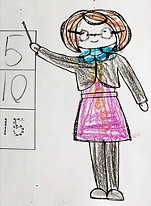The surprise exam
Preface
 This was written in 2009. I explain why I think the surprise exam paradox is just a subtle version of the paradox of the heap. This was not easy to figure out because this is one of the most confusing paradoxes in the world.
This was written in 2009. I explain why I think the surprise exam paradox is just a subtle version of the paradox of the heap. This was not easy to figure out because this is one of the most confusing paradoxes in the world.
 This was written in 2009. I explain why I think the surprise exam paradox is just a subtle version of the paradox of the heap. This was not easy to figure out because this is one of the most confusing paradoxes in the world.
This was written in 2009. I explain why I think the surprise exam paradox is just a subtle version of the paradox of the heap. This was not easy to figure out because this is one of the most confusing paradoxes in the world.
4. Origin of the paradox
According to Ekbom, some time around 1943 or 1944, he noticed a “difficulty” with a Swedish media broadcast concerning a civil defence exercise to be held the following week on a day that no participant would be able to predict beforehand.
(The difficulty is the same as ours.)
He relayed the difficulty to some mathematics and philosophy students in Stockholm University and word quickly got out. As far as anyone knows, this is the origin of the paradox.
But what is the “difficulty” that Ekbom would have noticed with the media broadcast in question? Is it simply that a certain curious line of reasoning seems to show that the surprise civil defence exercise cannot occur?
It must be more than that, since it also matters that the exercise in question was announced. If no announcement had been made, no one would have suspected anything and no question could arise of whether the exercise would be a surprise. (It surely would.) So it is only when the participants “get wind” of the exercise that the trouble starts at all.
More precisely, we can state Ekbom’s difficulty in this way:
The point of the announcement is to let the participants know of the upcoming exercise. But it seems that, as soon as they come to know of it, they can deduce certain things which ensure that the exercise can no longer surprise them in the way that was intended.
This means that the participants cannot take the announcement seriously. As soon as they do, the announcement will strike them as being false and they will be compelled to abandon it at once.
So the announcement appears to be impotent, or self-defeating. It seems unable to fulfil the informative role that it would normally be expected to play. Its purpose is to inform, but, strangely enough, it cannot do that. (Such is the charge.)
 This is rightly deemed a “difficulty” because, to normal eyes, the announcement does not seem to be impotent in that way at all.
This is rightly deemed a “difficulty” because, to normal eyes, the announcement does not seem to be impotent in that way at all.
Thus, when Ekbom hears the announcement, doesn’t he thereby learn that a surprise exercise will soon occur? Isn’t the point of the announcement to let the public know of the upcoming exercise? Does it not succeed in doing that?
Likewise, in terms of our exam, can the teacher not inform the class of the upcoming surprise exam and then proceed to hold the exam as planned? Don’t teachers do this all the time?
This is the true paradox before us. It does not concern whether the surprise exam can occur per se, but whether the teacher can let the class know that the surprise exam was going to occur without thwarting the very occurrence of the exam. Common sense tells us that she can, but if the student is right, then, try as she might, she cannot make the class know that the surprise exam was going to occur. Any announcement she makes would defeat itself and could not sensibly be embraced by the class.
This is the “difficulty” that Ekbom would have noticed in the media broadcast in question. As soon as he takes the broadcast seriously, he seems to have grounds to dismiss it, and so he cannot take the broadcast seriously! This doesn’t mean that the broadcast cannot be true. The point is only that Ekbom cannot take it to be true. Equally, he cannot know it to be true, or believe it, or otherwise accept, embrace, or take the broadcast to heart.
This is essentially the same diagnosis as before. In terms of the exam, the paradox is not so much over whether the surprise exam can occur, but over whether the class can come to know (accept, believe, embrace) that it was going to occur, e.g., on the word of the teacher.
If the student is right, the unexpected cost of attaining such knowledge is the falsification of the very thing that is supposed to be known, which means that such knowledge is unattainable, after all.
To see if the student is right, we should first consider an undisputed case of this phenomenon to see what we are up against. There are such things as “impotent,” “self-defeating” or “unknowable” announcements and it will help to see a clear case of one.
According to Ekbom, some time around 1943 or 1944, he noticed a “difficulty” with a Swedish media broadcast concerning a civil defence exercise to be held the following week on a day that no participant would be able to predict beforehand.
(The difficulty is the same as ours.)
He relayed the difficulty to some mathematics and philosophy students in Stockholm University and word quickly got out. As far as anyone knows, this is the origin of the paradox.
But what is the “difficulty” that Ekbom would have noticed with the media broadcast in question? Is it simply that a certain curious line of reasoning seems to show that the surprise civil defence exercise cannot occur?
It must be more than that, since it also matters that the exercise in question was announced. If no announcement had been made, no one would have suspected anything and no question could arise of whether the exercise would be a surprise. (It surely would.) So it is only when the participants “get wind” of the exercise that the trouble starts at all.
More precisely, we can state Ekbom’s difficulty in this way:
The very announcement of the exercise threatens to ensure that the exercise can no longer occur!
Let’s consider what this means.The point of the announcement is to let the participants know of the upcoming exercise. But it seems that, as soon as they come to know of it, they can deduce certain things which ensure that the exercise can no longer surprise them in the way that was intended.
This means that the participants cannot take the announcement seriously. As soon as they do, the announcement will strike them as being false and they will be compelled to abandon it at once.
So the announcement appears to be impotent, or self-defeating. It seems unable to fulfil the informative role that it would normally be expected to play. Its purpose is to inform, but, strangely enough, it cannot do that. (Such is the charge.)

Thus, when Ekbom hears the announcement, doesn’t he thereby learn that a surprise exercise will soon occur? Isn’t the point of the announcement to let the public know of the upcoming exercise? Does it not succeed in doing that?
Likewise, in terms of our exam, can the teacher not inform the class of the upcoming surprise exam and then proceed to hold the exam as planned? Don’t teachers do this all the time?
This is the true paradox before us. It does not concern whether the surprise exam can occur per se, but whether the teacher can let the class know that the surprise exam was going to occur without thwarting the very occurrence of the exam. Common sense tells us that she can, but if the student is right, then, try as she might, she cannot make the class know that the surprise exam was going to occur. Any announcement she makes would defeat itself and could not sensibly be embraced by the class.
This is the “difficulty” that Ekbom would have noticed in the media broadcast in question. As soon as he takes the broadcast seriously, he seems to have grounds to dismiss it, and so he cannot take the broadcast seriously! This doesn’t mean that the broadcast cannot be true. The point is only that Ekbom cannot take it to be true. Equally, he cannot know it to be true, or believe it, or otherwise accept, embrace, or take the broadcast to heart.
This is essentially the same diagnosis as before. In terms of the exam, the paradox is not so much over whether the surprise exam can occur, but over whether the class can come to know (accept, believe, embrace) that it was going to occur, e.g., on the word of the teacher.
If the student is right, the unexpected cost of attaining such knowledge is the falsification of the very thing that is supposed to be known, which means that such knowledge is unattainable, after all.
To see if the student is right, we should first consider an undisputed case of this phenomenon to see what we are up against. There are such things as “impotent,” “self-defeating” or “unknowable” announcements and it will help to see a clear case of one.
Menu
 What’s a logical paradox?
What’s a logical paradox? Achilles & the tortoise
Achilles & the tortoise The surprise exam
The surprise exam Newcomb’s problem
Newcomb’s problem Newcomb’s problem (sassy version)
Newcomb’s problem (sassy version) Seeing and being
Seeing and being Logic test!
Logic test! Philosophers say the strangest things
Philosophers say the strangest things Favourite puzzles
Favourite puzzles Books on consciousness
Books on consciousness Philosophy videos
Philosophy videos Phinteresting
Phinteresting Philosopher biographies
Philosopher biographies Philosopher birthdays
Philosopher birthdays Draft
Draftbarang 2009-2024  wayback machine
wayback machine
 wayback machine
wayback machine
 Paradox Lost (1971), by Ian Stewart.
Paradox Lost (1971), by Ian Stewart.

